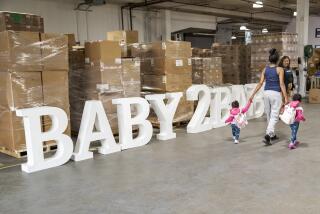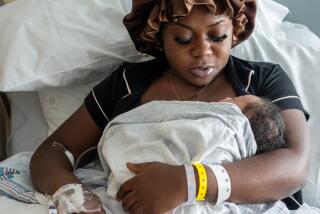Medical Center Seeks Amniotic Fluid to Aid Sick Premature Infants
- Share via
UC San Diego Medical Center officials Friday urged that pregnant women planning to undergo a Caesarean section donate their amniotic fluid to help treat sick premature babies with a technique pioneered at the hospital.
Under the program announced Friday, the treatment, which involves isolating a lung lubricant from the amniotic fluid and giving it to sick infants, will become more readily available.
Since 1982, 59 premature infants diagnosed as suffering from respiratory distress syndrome have been treated at the medical center with the lubricating surfactant extracted from the amniotic fluid of women who delivered healthy, full-term babies by Caesarean section.
The method of isolating the lung lubricant, which prevents the underdeveloped lungs from collapsing, was developed at UCSD by a research team headed by Dr. T. Allen Merritt. Only two other hospitals in the country, one in New York and another in Kansas City, Mo., are using the treatment, Merritt said.
The treatment was tried on rabbits and lambs before it was first used on human babies in 1982. In April, 1983, Merritt reported the results of a study in which four of five severely ill infants responded to the surfactant treatment.
“The surfactant is used to minimize the injury to the babies in our attempts to keep these babies alive,” Merritt said at a press conference Friday. Premature babies with underdeveloped lungs traditionally have been given oxygen through a respirator until the infant is able to produce the lubricant on its own. That treatment, however, can damage their delicate lungs and is successful among only 70% of the infants who weigh more than 2.2 pounds, Merritt said.
To broaden the availability of the treatment, UCSD Medical Center and the March of Dimes--which, along with Children’s Hospital, have donated $78,000 for the research--are making the appeal for amniotic fluid.
The amniotic fluid from seven to 10 women is needed to treat one sick baby, Merritt said. The fluid is processed to extract the lubricating agent before it is dripped through a tube in the baby’s windpipe to the lungs.
“Amniotic fluid is a very precious resource and one that women can donate to save sick babies,” Merritt said. “If they have to have a Caesarean section, then their amniotic fluid can help another baby.”
In addition to UCSD Medical Center and Sharp Memorial, Kaiser Permanente, the Navy Hospital in Balboa Park, Scripps Memorial in La Jolla and Grossmont Hospital are collecting the fluid.
The March of Dimes will spend $2,300 during February and March on posters and brochures advocating the program, said Vicki Hoffman, a spokesman for the March of Dimes. Women who are scheduled for a Caesarean delivery may call the March of Dimes for more information.
More to Read
Sign up for Essential California
The most important California stories and recommendations in your inbox every morning.
You may occasionally receive promotional content from the Los Angeles Times.













